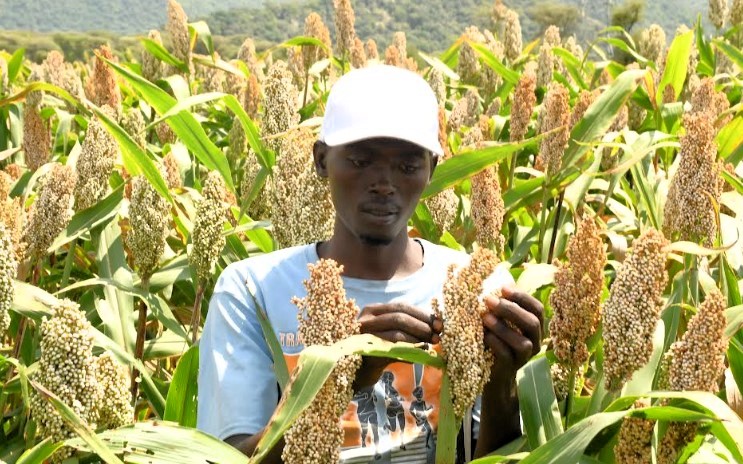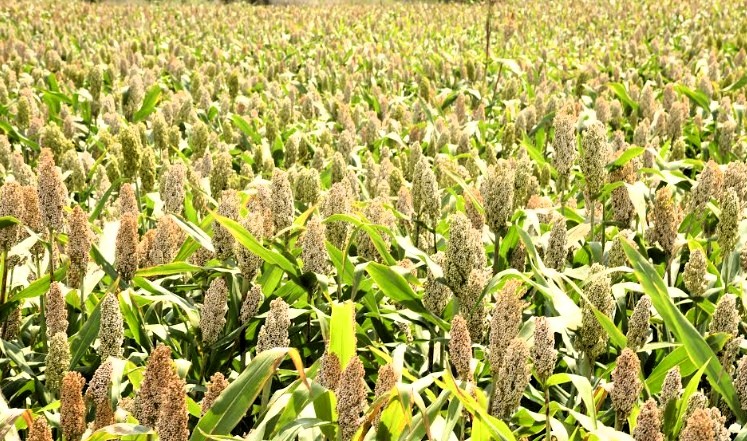Along a winding footpath flanked by thorny trees and dense shrubs lies a 35-acre stretch of land transformed into a thriving sorghum farm. Nestled in Kobulwo location in Kerio Valley, Elgeyo Marakwet County, the farm is managed by members of the Kobulwo Farmers Cooperative Society, who have embraced contract farming as a path to financial stability.
Perched atop hills acting as natural watchtowers scattered across the fields, vigilant farmers guard their maturing crop from birds, a practice born out of necessity to protect their livelihoods.
Among the guardians of this transformation is 27-year-old Yusuf Kipchumba, a Kenyatta University graduate with a BSc in Animal Health and Production. Despite his youth, Kipchumba serves as the chairperson of the 126-member society, which comprises farmers of all ages.
“This is not a youth group,” he notes. “But the members believed in me and entrusted me with leadership.”
After graduating in July 2023, Kipchumba briefly worked at a poultry farm in Uganda. However, the experience was short-lived. “The pay was too little and the working environment was not conducive, so I quit,” he recalls.
Returning home, he rekindled his passion for farming, an interest that had supported his education over the years. Now a father, he says farming offers him independence and peace of mind.
“Here on my farm, I have peace of mind; I am my boss, set my targets, and despite challenges here and there, I confront them as they come,” he says.
Kipchumba highlights the advantages of growing sorghum in the Kerio Valley, a region known for its harsh, arid climate. “Sorghum is drought-resilient and matures in 3–4 months. One acre yields 15–20 bags of 110kg each,” he explains.
Currently, the cooperative has a contract with Crops Soko, a buyer offering KShs 52 per kilogram of sorghum, a significant gain for local farmers. “This means a farmer will be earning between KShs 70,000 to 90,000 per acre. I have 3.5 acres, so I’m expecting to earn KShs 250,000 at the end of the harvest,” Kipchumba says.
However, the path to securing fair prices has not been easy. In 2023, a buyer reneged on an initial agreement, lowering the purchase price after harvest due to the absence of a formal contract. “Because we had not signed any contract, there was nothing we could do,” he says. Even a local sacco they partnered with later reduced the agreed price from KShs 52 to KShs 45 per kilo.
“Once bitten, twice shy,” he remarks. “This year we signed a contract with Crops Soko and therefore we are confident that they will buy our sorghum at the price we agreed.”
Kipchumba is urging the government to address a more persistent challenge: water scarcity. The farmers rely on seasonal rains for planting, restricting them to a single growing season. “Streams are flowing downstream, which run dry during drought times, and therefore, if we had a dam, we would be doing irrigation farming, thus having more than two planting seasons, which would increase our earnings,” he says.

Production costs remain high due to manual harvesting. On average, they hire 20 people per acre for harvesting, paying each KShs 300 daily. An additional KShs 300 per day is spent on labour to scare away birds. “We are lucky to have a small sheller machine, which takes around 5–10 people to shell the 15–20 bags per acre for KShs 300 per day,” he adds.
Cleaning the sorghum is another labour-intensive task. “We hire women who are good at winnowing, and because the job is tough with a lot of dust, we pay them KShs 500 per day,” he notes.
While the cooperative provides jobs to many, Kipchumba says mechanization could significantly cut costs and increase profitability. Their proximity to the Rimoi Game Reserve poses yet another challenge. Elephants from the reserve often stray into farms, causing destruction. “They are a threat to farmers as they can destroy a whole harvest in a day,” Kipchumba warns, appealing to the county government to fence the reserve to protect crops and reduce sleepless nights for farmers on guard duty.
The cooperative has also established an aggregation store at Kobulwo centre, where members bring various produce, including groundnuts, finger millet, and green grams. Sorghum farming, however, has proven to be a game-changer, especially in supporting livestock during dry spells.
Kipchumba’s academic background is proving useful beyond the farm. “Sorghum stalks are very nutritious to animals,” he says, adding that he teaches fellow farmers how to store feed, ensuring a consistent fodder supply all year round.
Despite the hurdles, Kipchumba believes agriculture is a viable career, especially for the youth. “I call on the youth to stop staying idle at home waiting for white-collar jobs and instead redirect their energy to farming,” he urges. “The jobs will find them as they earn a living.”
His wife, a Bachelor of Education graduate, has also joined him in farming. On this particular day, she’s among those scaring away birds, an example of the couple’s shared commitment to building their future through agriculture. Their earnings now sustain their household, including educating their young child who has just joined PP1.
Looking ahead, the cooperative aims to partner with seed companies such as Kenya Seed for certified seed production, a critical gap in the region. They also plan to start value addition initiatives and establish a petrol station at Kobulwo centre to diversify their income.
As the youngest member of the Sacco’s executive, Kipchumba is grateful for the trust placed in him. “I foresee a situation where members will take their children to school without waiting for bursaries, will be able to feed themselves and become economically independent because farming pays,” he concludes.



